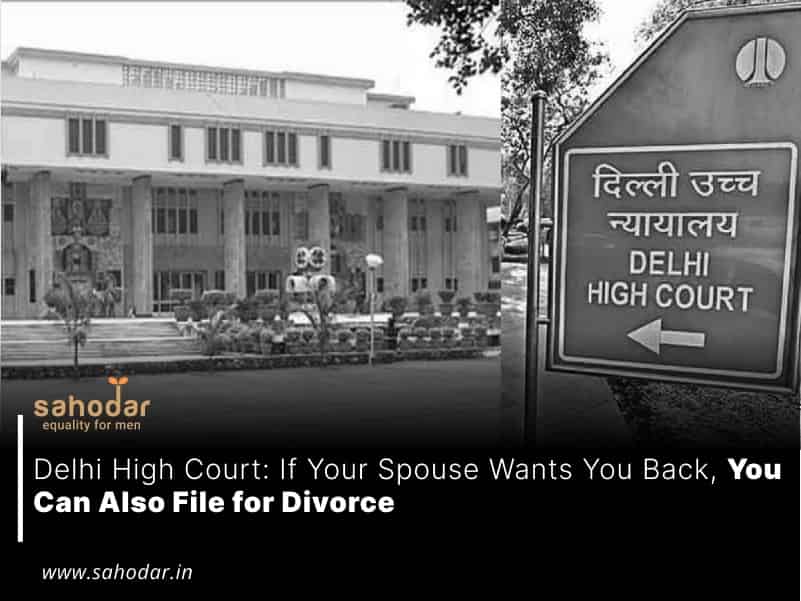The Delhi High Court has judicially noted that a spouse upon whom a decree of restitution of conjugal rights has been imposed possesses the legal standing to pursue divorce proceedings under Section 13 (1A)(ii) of the Hindu Marriage Act.
In a matter brought before the court, an appeal was lodged under Section 19(1) of the Family Court Act, 1984, on behalf of the wife. This appeal contested the divorce decree issued under Section 13(1)(ia) and Section 13(1A)(ii) of the Hindu Marriage Act, 1955, on grounds of cruelty and the absence of restitution of conjugal rights for a duration exceeding one year subsequent to the pronouncement of the restitution decree.
A bench of Justice Neena Bansal Krishna and Justice Suresh Kumar Kait thus observed: “The very fact that Section 13 (1A) (ii) of the Hindu Marriage Act, enures to the benefit of “either party” clearly implies that in case of non-compliance of a Decree under Section 9 of the HMA, either party is entitled to seek divorce on this ground and the Judgment Debtor cannot be precluded from exercising his right to avail the relief thereof. Section 23 cannot be interpreted in a way to completely render the remedy under Section 13 (1A) (ii) otiose”
In the instant matter, the respondent-husband, in his Divorce Petition, averred that subsequent to the matrimonial union, the parties initially cohabited in Nagina, Haryana, alongside the respondent’s parents. However, the appellant-wife expressed dissatisfaction with this arrangement. Consequently, upon her insistence, the parties relocated to Delhi, where they took up residence with the respondent’s brother and sister-in-law due to the financial incapacity of the respondent to establish an independent domicile in a metropolitan locale such as Delhi.
Regrettably, the appellant exhibited an unyielding and volatile disposition, frequently engaging in contentious interactions with the sister-in-law over trivial matters. These altercations escalated into quarrels and disputes between the appellant and the sister-in-law. Subsequently, in response to the appellant’s irresponsible, erratic, and confrontational conduct, the respondent was necessitated to establish a separate abode in Delhi in the year 2004. Despite the physical separation, the appellant’s demeanor persisted, marked by disrespect and confrontations, notably upon the respondent’s return from professional engagements. These confrontations often resulted in the respondent departing for work without partaking of his morning sustenance on numerous occasions.
The respondent asserted that he procured an LIC Policy to secure the financial well-being of his wife in the event of his incapacitation or demise. Despite facing financial constraints, he diligently endeavored to fulfill her needs. Throughout her pregnancy, he provided attentive care within his financial means, enduring her emotional outbursts with the hopeful anticipation of eventual resolution. However, the respondent was unjustly accused of infidelity. Following the birth of their child, during a visit from a family acquaintance to offer congratulations, the appellant publicly leveled allegations of extramarital involvement against her husband, causing significant mental anguish and public humiliation. Additionally, she frequently impugned the respondent’s fidelity, citing his prolonged office absences as evidence.
Moreover, it was contended that the appellant attributed her discontent and perceived lack of material comforts solely to the respondent, holding him responsible for her grievances. Her unwavering pursuit of a more affluent social status led to recurrent discord with the respondent, as she adamantly refused to accommodate their financial limitations.
“The various incidents narrated by the respondent towards the overall conduct and a non-adjusting attitude of the appellant who lacked maturity to even sort out the differences with the husband, leads to the irresistible conclusion that such conduct was bound to cause a grave apprehension in the mind of the respondent disrupting his mental equilibrium. Though these incidents may seem to be innocuous, insignificant or trifling when considered independently, but when such conduct prevails over a period of time, it is bound to create mental stress of the kind, which makes it impossible for the parties to survive in their matrimonial relationship…A wife should not be a constant reminder of one’s financial limitations. Pressurizing spouse to fulfil distant and whimsical dreams clearly not within his financial reach may create a sense of persistent dissatisfaction which would be sufficient mental strain to drain the contentment and tranquility out of any married life. One must tread carefully between the needs, wants and desires”, the bench noted in the order.
The wife argued that since a decree for the Restitution of Conjugal Rights was issued against the husband and he has failed to adhere to it, he is precluded from benefiting from his own delinquency, pursuant to Section 23 of the Hindu Marriage Act.
“This is also evident from the language of under Section 13 (1A) (ii) of the HMA which is to the effect that “either party”, which includes the decree holder as well as the judgment debtor, who can seek divorce in case of noncompliance of decree of Restitution of Conjugal Rights. If the Parliament intended that it is only the party in whose favour the restitution has been allowed, who can avail the remedy under Section 13 (1A) (ii) of the HMA, then the language would have been accordingly used in the said Section. The very fact that Section 13 (1A) (ii) of the Hindu Marriage Act, enures to the benefit of “either party” clearly implies that in case of non-compliance of a Decree under Section 9 of the HMA, either party is entitled to seek divorce on this ground and the Judgment Debtor cannot be precluded from exercising his right to avail the relief thereof. Section 23 cannot be interpreted in a way to completely render the remedy under Section 13 (1A) (ii) otiose.”, the court said while upholding divorce granted on this ground also.

